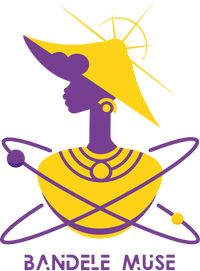As you may know, Bandele Muse is an inner-galactic African life and style experience. That means, among other things, futurism is a heavy inspiration and influence. Did you know there is now a distinction being made between Afrofuturism and Africanfuturism? Funnily enough, while reading more about this, I now recognize that Bandele Muse is a blend of both. Let’s unpack that.
What is Afrofuturism?
Afrofuturism is defined as a cultural aesthetic, philosophy of science, and philosophy of history exploring the developing intersection of African diaspora culture with technology. It is most commonly associated with science fiction, but can also encompass fantasy, alternate history, and magical realism.
In other words, according to Delan Bruce in UCLA Magazine, Afrofuturism is “the story of musicians, artists, writers, philosophers, fashion icons, filmmakers, costume designers, actors, activists, and academics who have believed in a better future for Black people - and for all people.”

Originally, Afrofuturism was coined by Mark Dery, a white American critic, in 1993 to describe so-called speculative fiction that depicted African Americans with technology and an enhanced future. However, there were works of Afrofuturistic art produced way before this.
In music, the term was first used to describe artists like Sun Ra, George Clinton, and Jimi Hendrix. Later, Missy Elliott, Outkast, and Janelle Monae were added to the list.
The documentary “The Last Angel of History” by Ghanaian/British filmmaker John Akomfrah also helps to get a better sense of music's influence in Afrofuturism.
In literature, I am still always on the lookout to add to my Afrofuturism library. Did you know, the very first Afrofuturistic writer (as far as we know) was W. E. B. Du Bois? His short story "The Comet" is still being heavily studied. If you want to read more, your starter pack must include everything by Octavia Butler and N.K. Jemisin, in my respectful opinion.
What is Africanfuturism?
Africanfuturism was coined by Nnedi Okorafor, a Nigerian-American author, in 2019 as a subcategory of science fiction that is directly rooted in African culture, history, mythology, and point of view. It does not privilege or center the West. She also coined Africanjujuism as a subcategory of fantasy that blends African spiritualities and cosmologies with the imaginative.
Africanfuturism is focused on Africa and the future, accepting what has already happened, and incorporating history, culture, and juju.

Since this is a recently coined term, other authors and artists have gradually embraced the term to describe their work. If you are looking to explore more, I suggest the following:
First, of course, everything by Nnedi Okorafor. I recommend you start with her series “Who Fears Death.” It will change your life for the better, or at least your imagination for the better.
Next, you need to check out “Africanfuturism: An Anthology” edited by Wole Talibi. It is available to download for free and includes stories by Nnedi Okorafor, TL Huchu, Dilman Dila, Rafeat Aliyu, and more.
Now, taking note of some recent work outside of literature, David Alabo is another artist to look out for. In this recent interview, it is cited that his work is labeled as “surrealist.” I respect that. If you look at his work, the influence of African folklore, and him being based in Ghana, one could see his artwork fitting very well in an Africanfuturism exhibit.
Regarding film, you need to check out “Jant Yi”, a fantasy film based in dystopian Dakar, Senegal, where humans must generate electricity from the energy expended with their own bodies. The film was created for the Fast Forward series, a collection of short films that explore the dreams of a regenerative world.
How can Bandele Muse be both Afrofuturism and Africanfuturism?
I feel the answer to this question will continue to evolve as Bandele Muse grows and I get more advanced in time traveling. At the moment, I see the influences of both.
With Afrofuturism, there is a push for representation, placing Black characters in titles and spaces that were previously denied; rewriting history, focused on oppression and racism. This reminds me of a new theme I have noticed recently with glimpses of Afrofuturism being used in “mainstream” film.
For example, Marvel’s Disney+ series Loki and film The Eternals illustrate this. Unlike Black Panther, which had a predominately Black cast and story, these other stories had one token Black character carry the entire Afrofuturistic element.
In Loki, the character He Who Remains, played by Johnathan Majors, is a 31st-century scientist who created the Time Keepers to prevent a multiversal war between evil variants of himself. The majority of the plot is focused on finding him for the ultimate answers and being confused as to what his true agenda is. He reminded me of The Wiz and Willy Wonka.
In The Eternals, the character Phastos, played by Brian Tyree Henry, is a weapons and technology inventor who is frustrated by how slow humans evolve and devastated when humans use his inventions to destroy each other. Later in the story, he marries an Arab man, has a son, and has used his scientific brilliance to create a home to protect the humans he loves.
Having Afrofuturism “branch out” in this way can possibly make a profound impact. Everything I have listed above shows Afrofuturism as a niche genre. Only certain groups may be aware of its existence. Note, there is nothing wrong with that. Using elements of Afrofuturism in Loki and The Eternals broadens that niche category. The goal to impact representation and history could possibly be further enhanced in this way. Almost like planting seeds in a foreign field.
With Africanfuturism, there is a push to be grounded. The characters are everyday people you would see in the neighborhood/ village or would typically hear about in African folklore. The plot focuses on community interactions and respect for, or rebellion against, rituals and traditions. This reminds me of similar themes I found in a few Africanfuturism books I read recently.
For example, Nnedi Okorafor’s “Who Fears Death” and Ciannon Smart’s “Witches Steeped in Gold” both carry themes of community and rebelling against traditions based in Africa.
In “Who Fears Death,” the character Onyesonwu, is the daughter of an Okeke woman raped by a Nuru man in post-apocalyptic Sudan, which illustrates the use of weaponized rape during war. When she grows up, she goes on a quest to find her father, who is a sorcerer, and defeat him with her own newly discovered magical powers. The team she picks up along the way and the experiences they have traveling by foot and camel further emphasize the themes of community and traditions.
“Witches Steeped in Gold” is a Jamaican-inspired fantasy with two main characters. Iraya, the daughter of the ruling family of the tribe that was conquered, and Jazmyne, the daughter of the current Queen, are from opposite rivalry tribes. Both are seeking vengeance against the Queen, but for most of the story are working against each other. Once they create an alliance, they uncover truths about their different magic, history, and traditions.
Having Africanfuturism portrayed through stories like these further establishes authentic African storytelling. Again, this is also a niche genre. Similar to African folklore, these stories do not only entice the imagination while teaching a moral lesson, but also question and hold accountable traditions, history, and community interactions.
Can Afrofuturism not include these themes too? Or is it too vast for one category? If so, do we also have Afrolatinafuturism, Afrocaribbeanfuturism, Afroasianfuturism, etc? As noted above, one of the stories is Jamaican inspired. Can I place that in Africanfuturism? Or should I categorize it as something else? It would be interesting to see those different futurism perspectives.
But, I digress.
With Bandele Muse, I, Dagny, am from the future. I traveled to the past, which is now, to shake things up, deliver vibes, and share some knowledge. That would be considered Afrofuturism as I might create a glitch in history, I do believe in a better future, and I am a tech geek. In addition to that, I am focused on a wholesome community, inspired by African identity and folklore, and share a holistic lifestyle. That would be considered Africanfuturism as I might have to reveal how future technology only works with African spirituality, I am based in Africa, and I would only serve you coconut water or Ribena during tea time.
I feel that is what makes this such an exciting experience.
What do you think of these distinctions? Make sure to join the Bandele Muse newsletter (if you have not already) so we can continue this conversation. I am looking forward to hearing from you.


